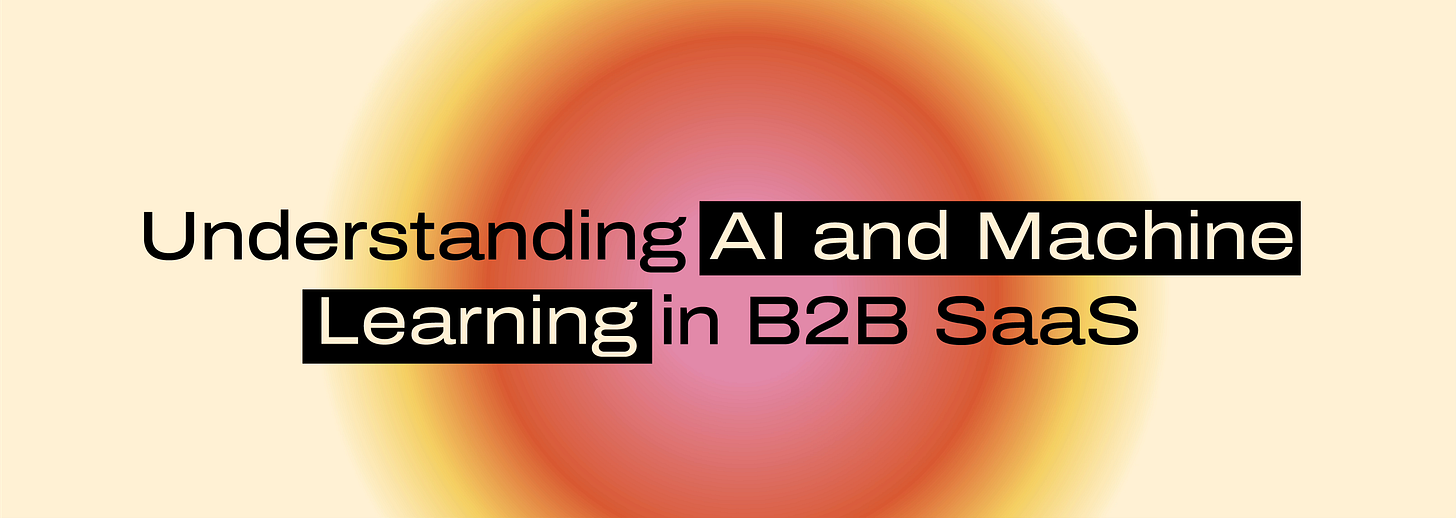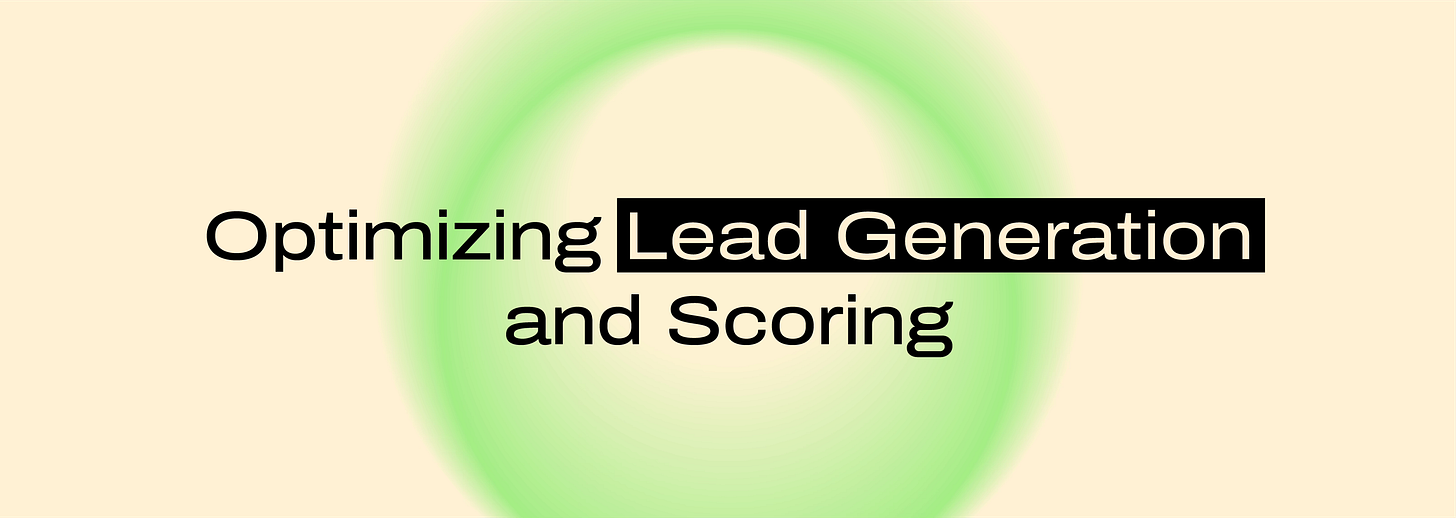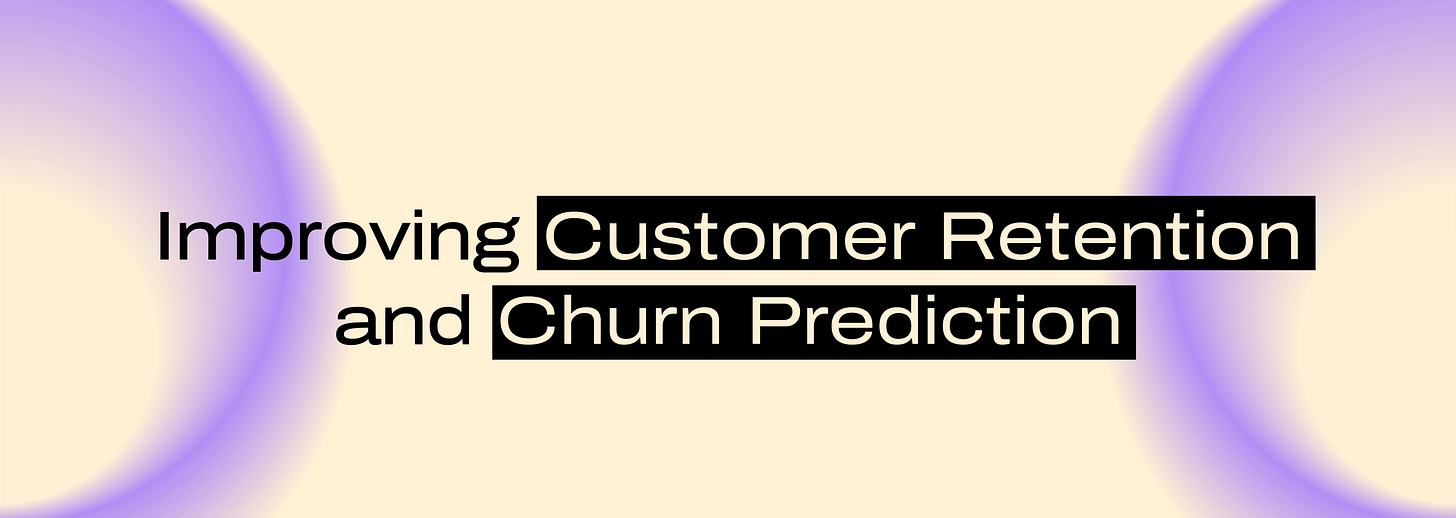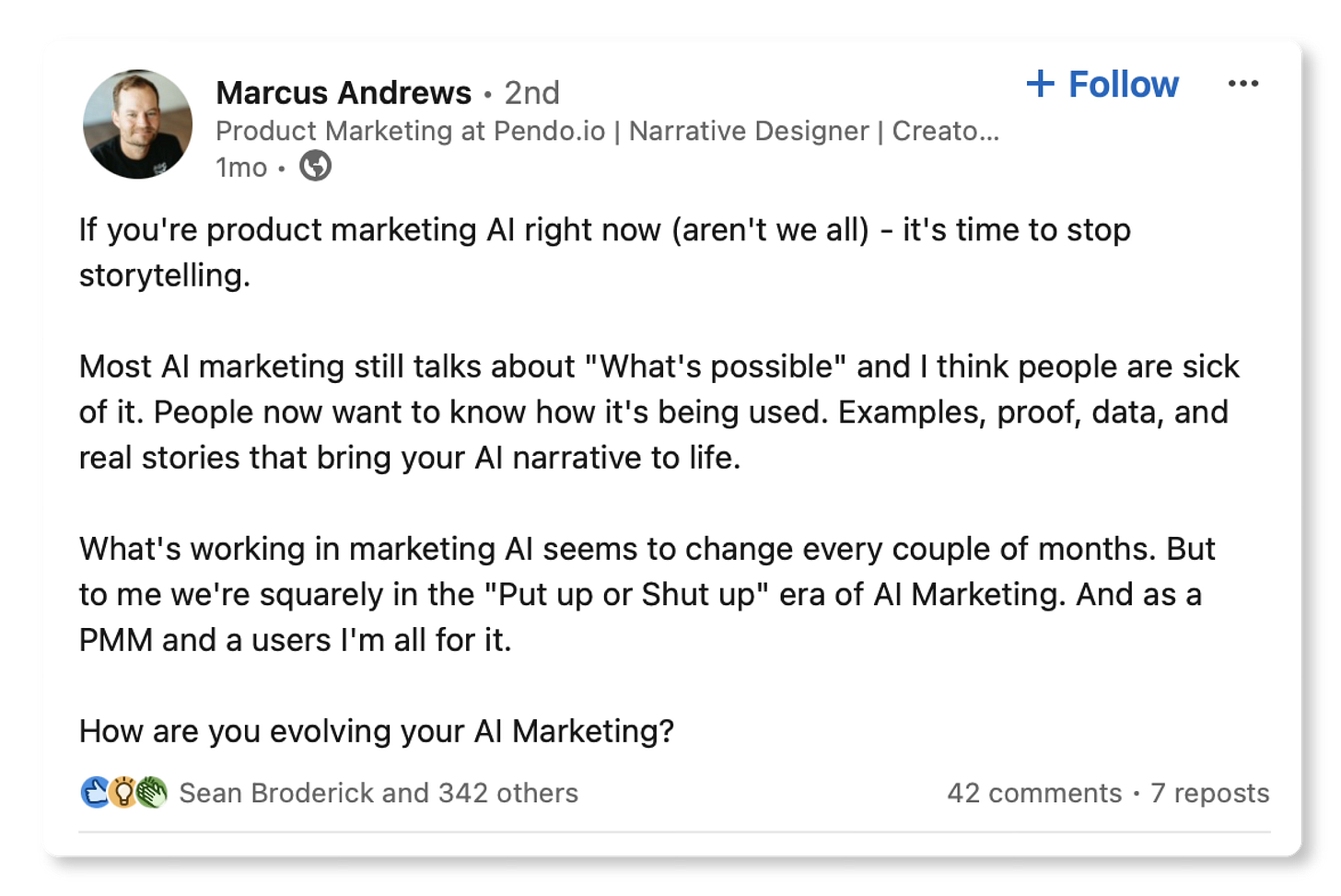Inside Olivine #30
The Role of AI and Machine Learning in B2B SaaS. ⚡Supercharge your product marketing efforts with these game-changers.
Hey there, it’s Alli, back with another newsletter for you! I’m thrilled to dive into a topic that’s truly reshaping the future of B2B SaaS product marketing: the incredible power of AI and machine learning.
AI and ML aren’t just buzzwords; they’re game-changers. These technologies are transforming the way we understand and engage with our customers, making our marketing strategies smarter and more efficient. In this newsletter, we’ll explore how AI and ML can supercharge your product marketing efforts, from personalizing customer experiences to predicting trends and automating tasks. Trust me, you don’t want to miss out on what’s happening in this space!
Understanding AI and Machine Learning in B2B SaaS
Artificial Intelligence (AI) and machine learning (ML) are transforming how businesses operate, especially in the B2B SaaS landscape. But what exactly are these technologies, and why are they so important? AI refers to the simulation of human intelligence processes by machines, while ML is a subset of AI that enables machines to learn from data and improve over time without being explicitly programmed.
Current trends show a significant rise in AI and ML adoption in B2B SaaS, driven by the need for more efficient processes and better customer insights. For instance, AI-powered chatbots and ML algorithms for predictive analytics are becoming commonplace.
Enhancing Customer Insights and Personalization
One of the biggest advantages of AI and ML is the ability to analyze vast amounts of data to uncover customer behavior and preferences—and doing it in about ⅛ the amount of time it would take our brains to do the same. This means you can quickly create highly personalized marketing campaigns that resonate with your target audience. For example, AI can help segment your customers based on their behavior, making your targeting more precise and effective.
Imagine launching a campaign that not only reaches the right people but also speaks directly to their needs and preferences. That’s the power of AI-driven personalization.
Optimizing Lead Generation and Scoring
Generating and prioritizing leads can be a daunting task, but AI can make it significantly easier. AI-driven lead generation strategies can identify potential customers who are most likely to convert, while machine learning algorithms can score and prioritize leads based on behavior and engagement.
Take HubSpot, for example. They use AI to analyze lead interactions and assign scores, helping sales teams focus on the most promising prospects. This not only saves time but also increases the chances of closing deals.
Improving Customer Retention and Churn Prediction
Keeping customers is just as important as acquiring new ones. AI models can predict which customers are at risk of churning and why. With this information, you can implement personalized retention strategies to keep them engaged.
For instance, an AI model might identify that customers who don’t use a specific feature are more likely to churn. Armed with this insight, you can proactively reach out to these customers with targeted campaigns to encourage feature adoption.
Automating and Enhancing Marketing Campaigns
AI can automate various marketing tasks, from email marketing to social media management. This not only increases efficiency but also ensures that your campaigns are always optimized. Machine learning can further enhance your campaigns by continuously analyzing performance and making adjustments in real time.
Think about how A/B testing works. With ML, you can run multiple tests simultaneously and get insights faster, allowing you to optimize your campaigns on the fly.
Enhancing Sales and Marketing Alignment
AI-driven insights can improve collaboration between sales and marketing teams. By aligning sales strategies with marketing efforts, you ensure that both teams are working towards the same goals. For example, AI can provide insights into which marketing messages resonate most with leads that convert. Sales teams can then tailor their pitches to better align with successful marketing campaigns.
Leveraging AI for Competitive Analysis
Staying ahead of the competition is crucial, and AI can help. AI tools can monitor competitors and analyze market trends, providing you with valuable insights. Machine learning algorithms can also help you understand competitor strategies and identify opportunities for differentiation.
For instance, using AI to track competitor pricing, product launches, and customer feedback can give you a strategic advantage. This allows your team to quickly adjust pricing, refine product features, and tailor marketing strategies to stay ahead of the competition. By anticipating competitor moves, you can proactively position your product as the better choice.
Ethical Considerations and Challenges
While AI offers many benefits, it’s important to consider the ethical implications and challenges. Issues like data privacy, algorithmic bias, and transparency need to be addressed. Best practices include ensuring data is used responsibly, being transparent about how AI decisions are made, and regularly auditing AI systems for bias.
Future Trends and Innovations
The future of AI and ML in B2B SaaS looks promising. Emerging technologies like natural language processing (NLP) and advanced predictive analytics are set to revolutionize how we approach product marketing.
NLP enables machines to understand and respond to human language more naturally, which means chatbots and virtual assistants that provide more personalized and engaging customer interactions. This leads to improved customer service and more efficient handling of inquiries.
Advanced predictive analytics takes data analysis to the next level by not only examining past behaviors but also forecasting future trends. This allows marketers to anticipate customer needs, optimize marketing strategies, and make more informed decisions. Imagine being able to predict which features will be most popular or identify potential churn risks before they happen 🤯 —this kind of foresight can be a game-changer for product marketing!
The potential of AI and ML in B2B SaaS is truly mind-blowing! Companies will soon have the power to predict customer needs before they even arise, automate marketing campaigns to run like a well-oiled machine, and personalize every interaction to make customers feel uniquely valued. That’s the reality we’re stepping into.
For marketers, the blend of these technologies with our skills will significantly boost the power and quality of our output. We’re not just creating products; we’re crafting experiences that resonate deeply with our audience. The ability to continuously adapt, innovate, and showcase the value of our offerings is what will set the next generation of successful tech companies apart.
Embrace these tools, explore their potential, and get ready to transform how you approach product marketing. The future is here, and it’s incredibly exciting!
Have you started integrating AI and ML into your B2B SaaS marketing strategies? Share your experiences with us! Want a top partner in B2B SaaS Product Marketing? We’re here for you. Reach out to us and mention this newsletter.
Top LinkedIn Post
Fresh Finds
Tool I love: ChatGPT - aka my assistant. Don’t we all love ChatGPT?
Shallow dive: Ever wondered how Trader Joe’s competed with bigger competitors? Klue wrote about it here.
Deep dive: Women in Product Marketing Podcast | Automation Anywhere Senior Vice President, Product & Solutions Marketing, Claudia Michon on AI and Product Marketing
Inside Olivine
Content Gems
Client Happenings
Job Openings
Canva is hiring a Senior Product Marketing Manager, B2B
Calm is hiring a Product Marketing Manager
Consensys is hiring a Lead Product Marketing Manager
















